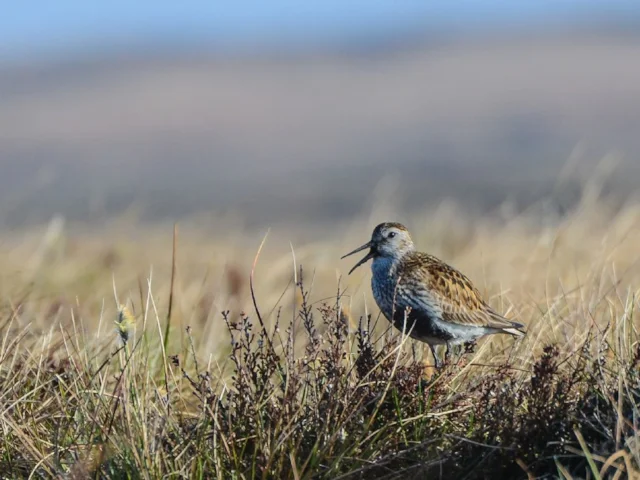Bumper year for breeding waders in the Peak District
1ca2b108-6223-4ca4-857c-aea00c3d8c89

Two threatened species of wader bred in record numbers at Dove Stone in the Peak District this season, thanks to the RSPB's ongoing programme of habitat restoration.
Over the summer, the RSPB recorded an unprecedented 44 pairs of Dunlin at the Saddleworth site, an increase of 37 pairs since 2004 and one pair up on last year’s previous record of 43. The nature conservation organisation also counted 19 pairs of Eurasian Curlew in a sample survey area, compared with 10 in 2004 and 16 in 2015.
The RSPB, which manages Dove Stone in partnership with landowner United Utilities, has found a direct correlation between the increase of breeding wading birds and the restoration of blanket bog habitat at the site.
Britain is home to a large proportion of the world’s blanket bog, as the cold and wet coastal climate is ideal for the formation of peat. Healthy bogs can provide great benefits both for people and wildlife, including locking up harmful atmospheric carbon and improving water quality, as well as providing nesting and foraging sites for wading birds.
However, like many of these bogs, the one at Dove Stone had been damaged by industrial air pollution, with the vegetation and peat-building sphagnum mosses having almost completely died out, leaving large areas of bare, dried-out peat.
Since 2005, United Utilities and the RSPB have been restoring the bog by covering the bare damaged peat with vegetation, blocking gullies to raise the water table and sowing new sphagnum moss. Earlier this year, the two organisations were awarded the EU Natura 2000 Award for conservation in recognition of this ongoing work.
Dave O’Hara, RSPB site manager at Dove Stone, said: “12 years ago Dunlins were on the brink of extinction in the Peak District. By restoring the bog, we’ve seen a steady increase and are now confident they have a future in the area. Our work is also helping us buck the worrying national trend for [Eurasian] Curlew. The breeding population of this much-loved bird is has almost halved since the mid-1990s so we are delighted and relieved that they appear to be increasing at Dove Stone.
“We hope more breeding waders will make Dove Stone their home in the summer months, as we continue to our work to restore the bog with our three-year Spreading the Mosses project in which we are planting over 70,000 handfuls of sphagnum moss across an area the size of 150 football pitches.”
Ed Lawrance, wildlife warden at United Utilities, added: “This is fabulous news and it’s very encouraging for everyone who is involved with the blanket bog recovery work. Landscape restoration like this takes years to come to fruition. We’re starting to see some indications that the quality of the water running off the moors into the reservoir is improving and that’s only going to get better as we continue our partnership work with the RSPB. That’s excellent news, not just for the bird life but also for water customers and the many visitors to the area.”
Over the summer, the RSPB recorded an unprecedented 44 pairs of Dunlin at the Saddleworth site, an increase of 37 pairs since 2004 and one pair up on last year’s previous record of 43. The nature conservation organisation also counted 19 pairs of Eurasian Curlew in a sample survey area, compared with 10 in 2004 and 16 in 2015.
The RSPB, which manages Dove Stone in partnership with landowner United Utilities, has found a direct correlation between the increase of breeding wading birds and the restoration of blanket bog habitat at the site.
Britain is home to a large proportion of the world’s blanket bog, as the cold and wet coastal climate is ideal for the formation of peat. Healthy bogs can provide great benefits both for people and wildlife, including locking up harmful atmospheric carbon and improving water quality, as well as providing nesting and foraging sites for wading birds.
However, like many of these bogs, the one at Dove Stone had been damaged by industrial air pollution, with the vegetation and peat-building sphagnum mosses having almost completely died out, leaving large areas of bare, dried-out peat.
Since 2005, United Utilities and the RSPB have been restoring the bog by covering the bare damaged peat with vegetation, blocking gullies to raise the water table and sowing new sphagnum moss. Earlier this year, the two organisations were awarded the EU Natura 2000 Award for conservation in recognition of this ongoing work.
Dave O’Hara, RSPB site manager at Dove Stone, said: “12 years ago Dunlins were on the brink of extinction in the Peak District. By restoring the bog, we’ve seen a steady increase and are now confident they have a future in the area. Our work is also helping us buck the worrying national trend for [Eurasian] Curlew. The breeding population of this much-loved bird is has almost halved since the mid-1990s so we are delighted and relieved that they appear to be increasing at Dove Stone.
“We hope more breeding waders will make Dove Stone their home in the summer months, as we continue to our work to restore the bog with our three-year Spreading the Mosses project in which we are planting over 70,000 handfuls of sphagnum moss across an area the size of 150 football pitches.”
Ed Lawrance, wildlife warden at United Utilities, added: “This is fabulous news and it’s very encouraging for everyone who is involved with the blanket bog recovery work. Landscape restoration like this takes years to come to fruition. We’re starting to see some indications that the quality of the water running off the moors into the reservoir is improving and that’s only going to get better as we continue our partnership work with the RSPB. That’s excellent news, not just for the bird life but also for water customers and the many visitors to the area.”

